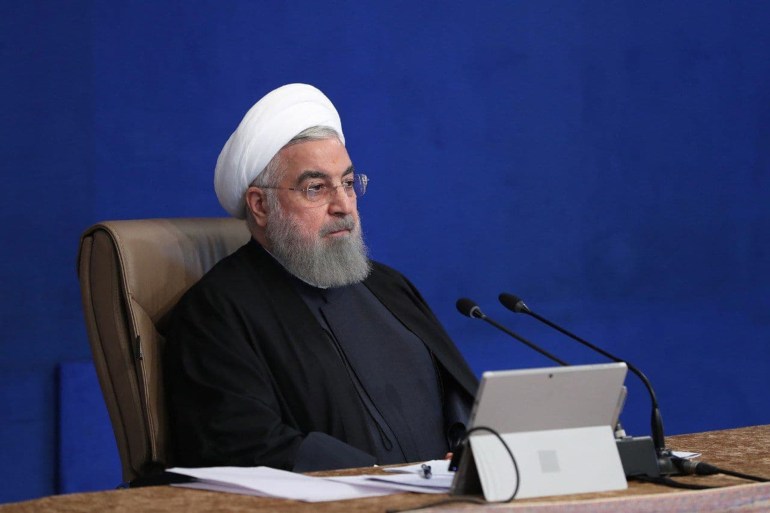Tehran informed the Security Council coordinator of the nuclear agreement its adherence to lifting sanctions before backtracking on reducing its commitments, at a time when Washington saw that Iran is moving in the wrong direction, but the door to diplomacy remains open.
Meanwhile, Iranian President Hassan Rouhani called on European countries to avoid "threatening or exerting pressure" in any negotiations with the Islamic Republic, during his meeting on Sunday with Irish Foreign Minister Simon Coveney in light of diplomatic efforts to revive the 2015 nuclear deal.
Coveney is visiting the Iranian capital in the context of his country's current role as a facilitator of UN Security Council Resolution 2231, which laid down the legal framework for the agreement between Iran and the six major powers (the United States, France, Britain, Germany, Russia and China) regarding Tehran's nuclear program, according to what the Irish Foreign Ministry announced.
"The ball is in Tehran's court."
In turn, US Secretary of State Anthony Blinken said that Iran is moving in the wrong direction and continues to take steps to make its nuclear program more dangerous.
Blinken added that the path to diplomacy is open regarding Iran's nuclear file, and the ball is in its court.
The United States unilaterally withdrew from the agreement in 2018 under former President Donald Trump, and re-imposed harsh economic sanctions on Tehran.
The administration of the new president, Joe Biden, expressed its intention to return to the agreement, but stipulated that Iran would resume full implementation of its nuclear obligations, which it began to backtrack on as of 2019. On the other hand, the Islamic Republic stresses the priority of lifting sanctions.
No threatening language
"The best way to solve problems with European partners at various bilateral, regional and international levels is to hold talks on the basis of mutual respect, away from the language of threat and exerting pressure," Rouhani said during his meeting with Coffini, according to a statement by the Iranian presidency.
He criticized "Europe's failure to implement its commitments" regarding the agreement, saying that Iran "committed itself to its obligations towards the agreement and maintained it, and it is the only party that has paid the price for that."
Rouhani stressed that "the situation cannot continue in its current form. Rather, Resolution 2231 (...) must be implemented by all parties concerned with the agreement to revive and preserve the agreement."
Rouhani: Tehran has abided by its commitments regarding the nuclear deal and has maintained it (Iranian press)
Parties concerned with the agreement have been making diplomatic efforts in recent times to seek to revive it, especially in terms of bridging the gap in the tension between Tehran and Washington over which party should take the first step.
On Thursday, the three European countries involved in the nuclear agreement changed their submission to the Board of Governors of the International Atomic Energy Agency, criticizing Iran for its decision last February to reduce some aspects of the work of the agency's inspectors in response to Washington's failure to lift sanctions.
'Encouraging signals'
Rouhani assured Kofini that Iran "remains firmly intent on cooperating with the International Atomic Energy Agency," according to the presidency.
The move to reduce the work of inspectors was the latest in a series of measures taken by the Islamic Republic to suspend many of its obligations under the nuclear deal, which it gradually started a year after the US withdrawal.
Prior to the start of the reduction in the work of inspectors on February 23, Iran reached a temporary technical agreement with the Director-General of the International Atomic Energy Agency, Rafael Grossi, allowing activities to continue for a period of up to 3 months.
A French diplomatic source said that the retreat from the draft resolution before the agency’s board of governors came after "encouraging signals" from the Iranian side regarding reviving the agreement.
Washington supported the European step, hoping that it would lead to Iran agreeing to "dialogue."
The Iranian Foreign Ministry also welcomed the retreat, saying that the step "may keep open the path of diplomacy that Iran and the International Atomic Energy Agency started."
And Tehran considered in late February that the time was "not appropriate" to respond to the proposal to hold an informal meeting on the nuclear deal in which the United States would participate, in response to a European proposal in this regard.
"Full and effective" lifting of sanctions
Cofini also met in Tehran his Iranian counterpart, Mohammad Javad Zarif, who reiterated his country's position calling for the lifting of US sanctions.
In a statement, the Iranian Foreign Ministry stated that the two sides discussed "the latest developments" in the nuclear agreement, and Zarif assured his guest of the need to lift the sanctions "completely and effectively," and that such a step would lead Tehran to backtrack on its "compensatory steps" that it took after the American withdrawal.
Zarif announced on Twitter on Friday that he would soon present "a constructive and concrete action plan through the appropriate diplomatic channels."
Ireland currently occupies a non-permanent seat in the Security Council, and plays the role of "facilitator" of Resolution 2231, which is responsible for reporting to the Council on the progress of implementation of the resolution adopted in the same year to conclude the nuclear agreement.
The foreign minister's visit comes days after Dublin announced its intention to resume its diplomatic presence in the Iranian capital at the charge d'affaires level, and to reopen an embassy in Tehran by 2023.

